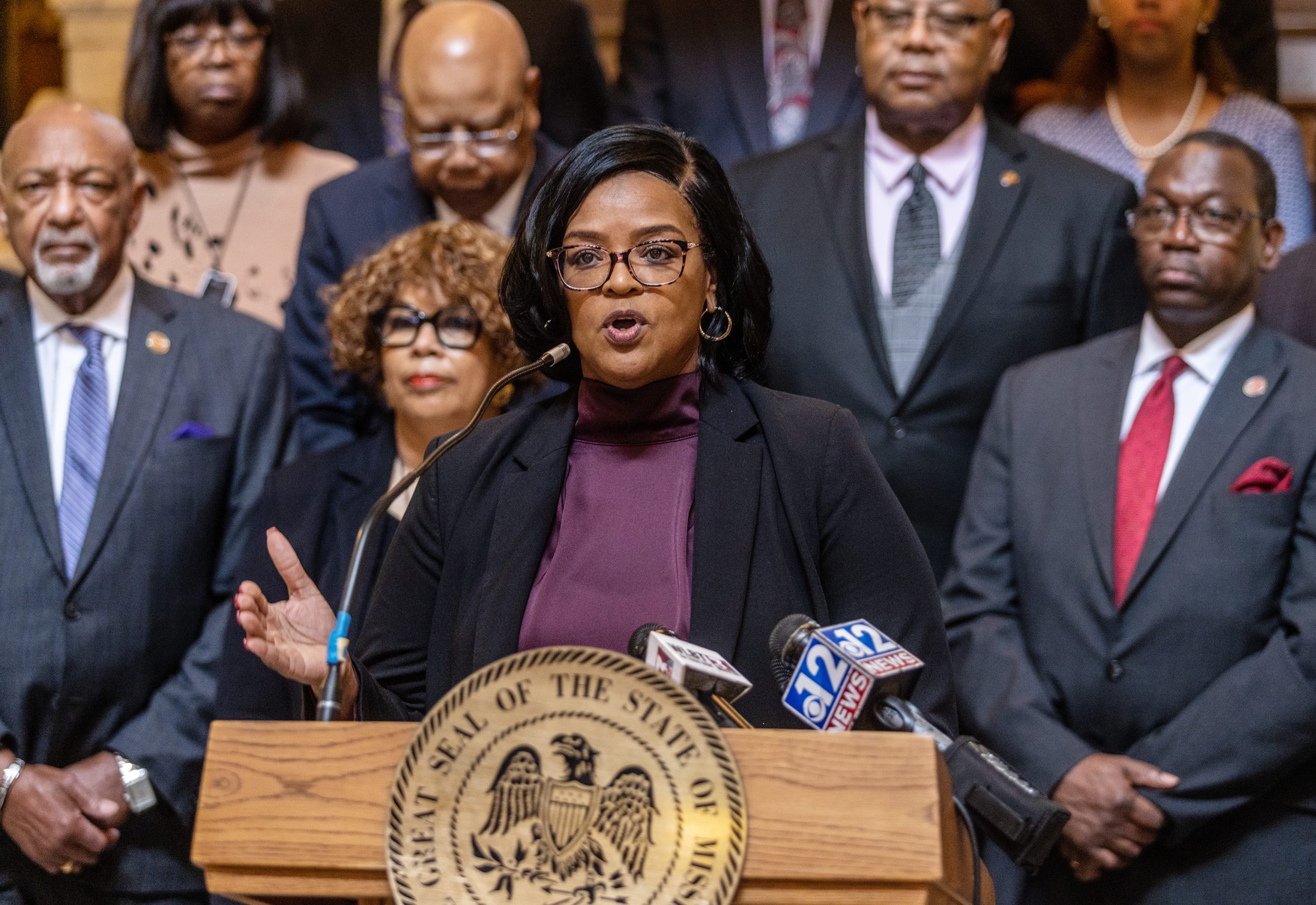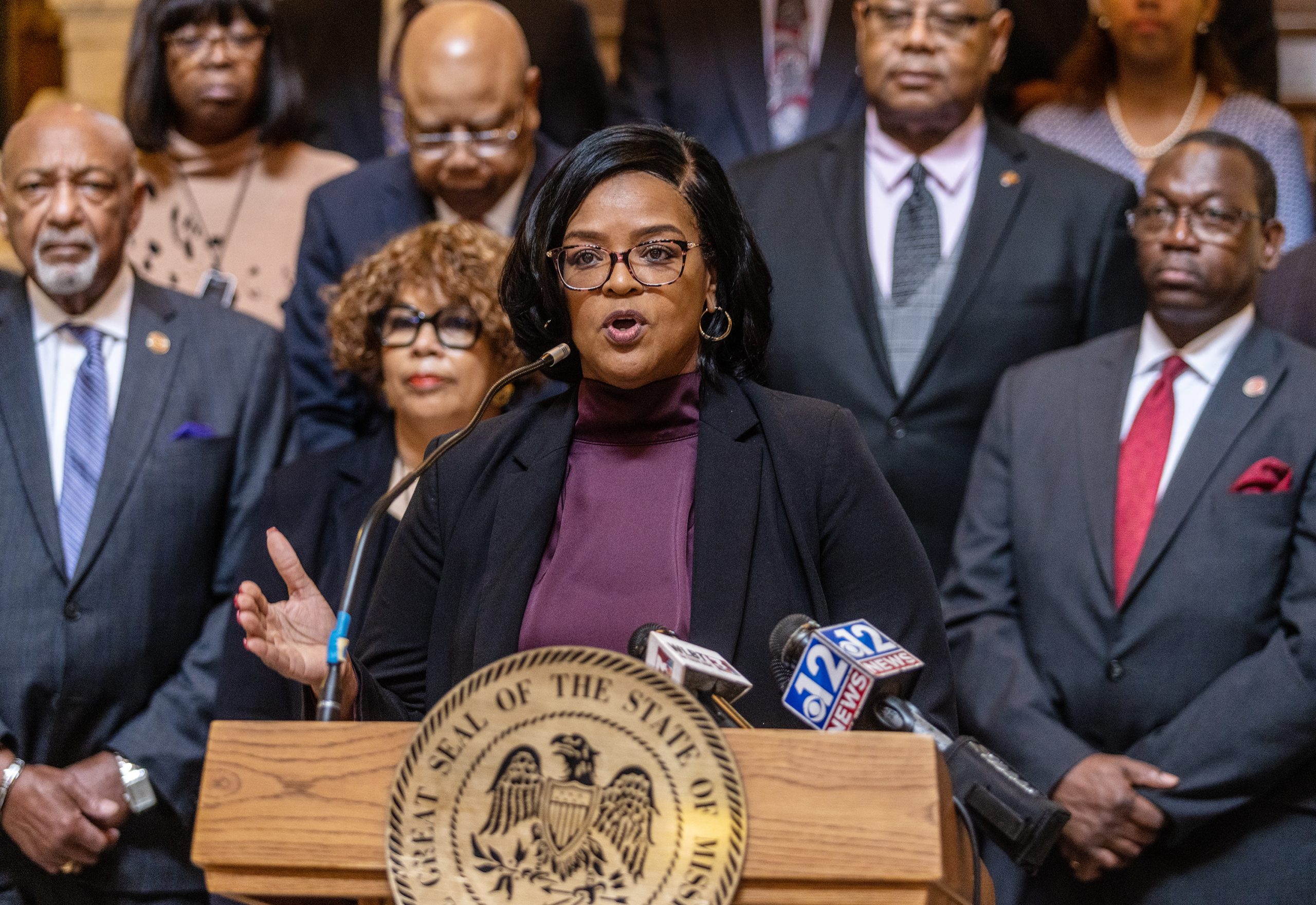Mississippi Today
‘Common-sense ideas’: Black Caucus outlines legislative agenda


‘Common-sense ideas’: Black Caucus outlines legislative agenda
The Mississippi Legislative Black Caucus on Wednesday presented its 2023 agenda, saying lawmakers should focus on helping “everyday Mississippians,” with health care, education, justice and equity, tackling government corruption and providing basic necessities such as clean drinking water.
“These are common-sense ideas,” said Sen. Angela Turner Ford, D-West Point, chairwoman of the caucus. “… We want to assist in the passage of legislation that improves the quality of life for everyday Mississippians.”
There are 51 Black lawmakers in the 174-member Mississippi Legislature, which is controlled by a white, Republican supermajority.
“We simply do not have the numbers to impact legislation like we would like, but that does not mean we are not working,” said Ford, who noted the group’s agenda was drafted in part from town-hall meetings with communities across the state.
The 2023 caucus agenda includes:
Health care: With Mississippi ranking worst or near-worst in nearly every health category or study, the caucus reiterated its support for expansion of Medicaid to help provide health coverage for the working poor.
“The (legislative leadership) has refused to call that policy up on the floor in the Senate and House for a vote or debate on that important policy,” Ford said. “… With our hospitals facing closure or partial closure, now is the time to act.”
Education: The caucus proposes full funding of the Mississippi Adequate Education Program. This funding formula, set in law, is supposed to provide schools statewide with equitable funding to cover basic education needs. But lawmakers have rarely funded the program even though it is law, typically shorting it by hundreds of millions of dollars a year. The caucus also said that in recent meetings with the Mississippi State Department of Education and parents, it discovered many parents and students do not know about services the agency offers, such as 24-hour tutoring, and wants to direct the agency to better disseminate information.
READ MORE: Podcast: What to watch for in 2023 legislative session
Infrastructure: The caucus agenda says “clean drinking water and high-speed internet are necessities that should be enjoyed by every Mississippian,” and that “the digital divide must be closed.” While the GOP legislative leadership has said it is reluctant to provide more money to the City of Jackson to address its water crisis because it is receiving large amounts of federal money, Ford said the caucus plans to push for more state help.
“People should have clean drinking water,” Ford said. “This is 2023, and that is not something we should have to argue or debate.”
Election reform: The caucus supports removing barriers to voting, and notes “Mississippi was ground zero for instituting the voting rights we have access to today.” The caucus supports early voting and wants to change Mississippi’s Jim Crow era restrictions on restoring the voting rights of convicted felons who have served their time.
Restoring ballot initiative: The caucus supports restoring Mississippians’ right to place issues on the ballot for popular vote. This initiative process was shot down in 2021 by a state Supreme Court ruling on medical marijuana. Numerous legislative leaders have vowed to restore the process, but have failed to do so after arguing over details.
Economic justice and racial equity: The caucus said numerous studies and reports have shown racial and other inequity in state spending and numerous other areas that should be addressed. The caucus supports child care tax credits and tax rebates for families with children, increasing the minimum wage and laws that combat discrimination in hiring, banking and finance and other areas. The caucus agenda calls for passage of “Crown Act” legislation enacted in other states that would forbid hiring or firing based on someone’s hair style, and also calls for Juneteenth to be recognized as a state holiday.
Criminal justice reform: The caucus has for years pushed for criminal justice reform, with some success but much more work needed. Its agenda calls for release of people locked up for non-violent offenses, juveniles sentenced to life without parole. The caucus also wants more reform of habitual offender laws. It continues to push for improved prison and jail conditions and called for simple possession of marijuana to cover civil penalties only, after the state enacted a medical cannabis program.
TANF reform: Mississippi’s welfare scandal should be a call for lawmakers to root out government corruption, and the caucus wants reform in how the state manages the Temporary Assistance for Needy Families program to ensure it helps the poor people it’s designed to help. Ford said one proposal members have discussed is having an appointed governing board to oversee how the Mississippi Department of Human Services spends the money.
ARPA funding: The caucus wants a say in how remaining federal American Rescue Plan Act pandemic relief money allocated to Mississippi is spent. It wants the Legislature to keep to the intended purposes of the money — including public health, helping communities recover financially, water and sewer infrastructure and broadband access and helping “those counties and cities that did not receive enough funds to complete critical water and sewer projects.”
The caucus noted that much of its agenda has been introduced in previous years and it will continue to discuss its priorities with leadership.
“Our agenda has been crafted with the plight of all Mississippians in mind.”
This article first appeared on Mississippi Today and is republished here under a Creative Commons license.
Did you miss our previous article…
https://www.biloxinewsevents.com/?p=203791
Mississippi Today
On this day in 1939, Billie Holiday recorded ‘Strange Fruit’

April 20, 1939

Legendary jazz singer Billie Holiday stepped into a Fifth Avenue studio and recorded “Strange Fruit,” a song written by Jewish civil rights activist Abel Meeropol, a high school English teacher upset about the lynchings of Black Americans — more than 6,400 between 1865 and 1950.
Meeropol and his wife had adopted the sons of Julius and Ethel Rosenberg, who were orphaned after their parents’ executions for espionage.
Holiday was drawn to the song, which reminded her of her father, who died when a hospital refused to treat him because he was Black. Weeks earlier, she had sung it for the first time at the Café Society in New York City. When she finished, she didn’t hear a sound.
“Then a lone person began to clap nervously,” she wrote in her memoir. “Then suddenly everybody was clapping.”
The song sold more than a million copies, and jazz writer Leonard Feather called it “the first significant protest in words and music, the first unmuted cry against racism.”
After her 1959 death, both she and the song went into the Grammy Hall of Fame, Time magazine called “Strange Fruit” the song of the century, and the British music publication Q included it among “10 songs that actually changed the world.”
David Margolick traces the tune’s journey through history in his book, “Strange Fruit: Billie Holiday and the Biography of a Song.” Andra Day won a Golden Globe for her portrayal of Holiday in the film, “The United States vs. Billie Holiday.”
This article first appeared on Mississippi Today and is republished here under a Creative Commons Attribution-NoDerivatives 4.0 International License.![]()
Mississippi Today
Mississippians are asked to vote more often than people in most other states

Not long after many Mississippi families celebrate Easter, they will be returning to the polls to vote in municipal party runoff elections.
The party runoff is April 22.
A year does not pass when there is not a significant election in the state. Mississippians have the opportunity to go to the polls more than voters in most — if not all — states.
In Mississippi, do not worry if your candidate loses because odds are it will not be long before you get to pick another candidate and vote in another election.
Mississippians go to the polls so much because it is one of only five states nationwide where the elections for governor and other statewide and local offices are held in odd years. In Mississippi, Kentucky and Louisiana, the election for governor and other statewide posts are held the year after the federal midterm elections. For those who might be confused by all the election lingo, the federal midterms are the elections held two years after the presidential election. All 435 members of the U.S. House and one-third of the membership of the U.S. Senate are up for election during every midterm. In Mississippi, there also are important judicial elections that coincide with the federal midterms.
Then the following year after the midterms, Mississippians are asked to go back to the polls to elect a governor, the seven other statewide offices and various other local and district posts.
Two states — Virginia and New Jersey — are electing governors and other state and local officials this year, the year after the presidential election.
The elections in New Jersey and Virginia are normally viewed as a bellwether of how the incumbent president is doing since they are the first statewide elections after the presidential election that was held the previous year. The elections in Virginia and New Jersey, for example, were viewed as a bad omen in 2021 for then-President Joe Biden and the Democrats since the Republican in the swing state of Virginia won the Governor’s Mansion and the Democrats won a closer-than-expected election for governor in the blue state of New Jersey.
With the exception of Mississippi, Louisiana, Kentucky, Virginia and New Jersey, all other states elect most of their state officials such as governor, legislators and local officials during even years — either to coincide with the federal midterms or the presidential elections.
And in Mississippi, to ensure that the democratic process is never too far out of sight and mind, most of the state’s roughly 300 municipalities hold elections in the other odd year of the four-year election cycle — this year.
The municipal election impacts many though not all Mississippians. Country dwellers will have no reason to go to the polls this year except for a few special elections. But in most Mississippi municipalities, the offices for mayor and city council/board of aldermen are up for election this year.
Jackson, the state’s largest and capital city, has perhaps the most high profile runoff election in which state Sen. John Horhn is challenging incumbent Mayor Chokwe Antar Lumumba in the Democratic primary.
Mississippi has been electing its governors in odd years for a long time. The 1890 Mississippi Constitution set the election for governor for 1895 and “every four years thereafter.”
There is an argument that the constant elections in Mississippi wears out voters, creating apathy resulting in lower voter turnout compared to some other states.
Turnout in presidential elections is normally lower in Mississippi than the nation as a whole. In 2024, despite the strong support for Republican Donald Trump in the state, 57.5% of registered voters went to the polls in Mississippi compared to the national average of 64%, according to the United States Elections Project.
In addition, Mississippi Today political reporter Taylor Vance theorizes that the odd year elections for state and local officials prolonged the political control for Mississippi Democrats. By 1948, Mississippians had started to vote for a candidate other than the Democrat for president. Mississippians began to vote for other candidates — first third party candidates and then Republicans — because of the national Democratic Party’s support of civil rights.
But because state elections were in odd years, it was easier for Mississippi Democrats to distance themselves from the national Democrats who were not on the ballot and win in state and local races.
In the modern Mississippi political environment, though, Republicans win most years — odd or even, state or federal elections. But Democrats will fare better this year in municipal elections than they do in most other contests in Mississippi, where the elections come fast and often.
This article first appeared on Mississippi Today and is republished here under a Creative Commons Attribution-NoDerivatives 4.0 International License.
Mississippi Today
On this day in 1977, Alex Haley awarded Pulitzer for ‘Roots’

April 19, 1977

Alex Haley was awarded a special Pulitzer Prize for “Roots,” which was also adapted for television.
Network executives worried that the depiction of the brutality of the slave experience might scare away viewers. Instead, 130 million Americans watched the epic miniseries, which meant that 85% of U.S. households watched the program.
The miniseries received 36 Emmy nominations and won nine. In 2016, the History Channel, Lifetime and A&E remade the miniseries, which won critical acclaim and received eight Emmy nominations.
This article first appeared on Mississippi Today and is republished here under a Creative Commons Attribution-NoDerivatives 4.0 International License.![]()
-

 News from the South - Alabama News Feed6 days ago
News from the South - Alabama News Feed6 days agoFoley man wins Race to the Finish as Kyle Larson gets first win of 2025 Xfinity Series at Bristol
-

 News from the South - Alabama News Feed7 days ago
News from the South - Alabama News Feed7 days agoFederal appeals court upholds ruling against Alabama panhandling laws
-

 News from the South - North Carolina News Feed5 days ago
News from the South - North Carolina News Feed5 days agoFDA warns about fake Ozempic, how to spot it
-

 News from the South - Virginia News Feed5 days ago
News from the South - Virginia News Feed5 days agoLieutenant governor race heats up with early fundraising surge | Virginia
-

 News from the South - Missouri News Feed3 days ago
News from the South - Missouri News Feed3 days agoDrivers brace for upcoming I-70 construction, slowdowns
-

 News from the South - Missouri News Feed5 days ago
News from the South - Missouri News Feed5 days agoAbandoned property causing issues in Pine Lawn, neighbor demands action
-

 News from the South - Oklahoma News Feed4 days ago
News from the South - Oklahoma News Feed4 days agoThursday April 17, 2025 TIMELINE: Severe storms Friday
-

 News from the South - Arkansas News Feed7 days ago
News from the South - Arkansas News Feed7 days agoTwo dead, 9 injured after shooting at Conway park | What we know

















































